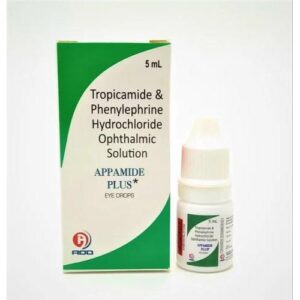PHENYLEPHRINE + TROPICAMIDE
Phenylephrine: Phenylephrine is a medication that is commonly used as a nasal decongestant, as well as to dilate the pupils during eye examinations. It is also sometimes used to treat low blood pressure.
Phenylephrine works by constricting blood vessels, which helps to decrease swelling and congestion in the nasal passages. This allows for easier breathing and relief from nasal congestion. When used to dilate the pupils, phenylephrine works by stimulating receptors in the iris muscles, causing them to contract and the pupil to dilate.
The dosing of phenylephrine may vary depending on the intended use. For nasal congestion, it is typically administered as a nasal spray or drops, with a recommended dose of 1 to 2 sprays or drops in each nostril, not more than every 4 hours. When used as a pupil dilator, it is usually administered as eye drops.
Some common side effects of phenylephrine include dizziness, headache, nervousness, increased heart rate, and increased blood pressure. These side effects are usually mild and go away on their own. However, more serious side effects can occur, such as chest pain, irregular heartbeat, or difficulty breathing. If any of these occur, medical attention should be sought immediately.
It is important to note that phenylephrine should be used with caution or avoided in individuals with certain medical conditions, such as high blood pressure, heart disease, or thyroid problems. It should also be used with caution in individuals taking certain medications, such as monoamine oxidase inhibitors (MAOIs) or beta-blockers.
Overall, phenylephrine is a commonly used medication for nasal congestion and pupil dilation. It should be used as directed by a healthcare professional and any concerns or questions should be discussed with them.
Tropicamide: Tropicamide is a medication that belongs to the class of drugs known as anticholinergics. It is primarily used as a mydriatic agent, which means it is used to dilate the pupil of the eye for ophthalmic examination or during eye surgery.
The mechanism of action of tropicamide involves blocking the activity of acetylcholine, which is a neurotransmitter that constricts the pupil. By inhibiting the action of acetylcholine, tropicamide causes the iris sphincter muscle to relax, resulting in the dilation of the pupil.
Tropicamide is typically administered as eye drops with a concentration of 0.5% or 1%. The usual dose for adults and children is one to two drops in the affected eye(s). It is important to follow the instructions provided by the healthcare professional or as labeled on the medication.
As with any medication, Tropicamide may cause some side effects. Common side effects include blurred vision, light sensitivity, stinging or burning sensation in the eyes, increased heart rate, dry mouth, and dry skin. These side effects are usually mild and temporary, but if they persist or worsen, it is recommended to seek medical advice.
In some cases, tropicamide can cause more severe side effects such as allergic reactions, increased intraocular pressure (especially in patients with narrow-angle glaucoma), confusion, hallucinations, and delirium. These side effects are rare but should be reported to a healthcare professional immediately if experienced.
It is important to note that tropicamide may interact with other medications or medical conditions. It is advised to inform the healthcare professional about any other medications being taken and any pre-existing medical conditions before starting treatment with tropicamide.

